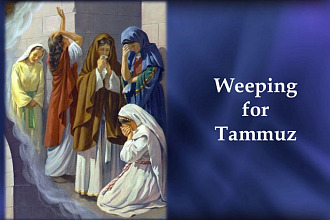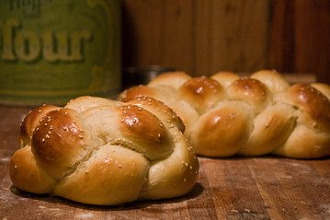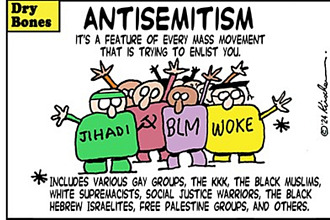"...You shall not boil a young goat in its mother's milk" (Deuteronomy 14:21). Many take this verse to mean it isn't kosher to have meat and dairy in the same meal, or even have milk and meat in the same refrigerator and on the same set of plates. However, I am not sure that it would be accurate. Here is why. When you compare other verses from the Torah on similar topics it seems to indicate that something other than food combinations is actually the point.
For example, "If you come across a bird's nest beside the road, either in a tree or on the ground, and the mother is sitting on the young or on the eggs, do not take the mother with the young. You may take the young, but be sure to let the mother go, so that it may go well with you and you may have a long life" (Deuteronomy 22:6-7); and "Do not slaughter a cow or a sheep and its young on the same day" (Leviticus 22:28).
It doesn't seem intellectually consistent for people to promote the idea that you cannot mix meat and milk in a broad sense based on their reasoning regarding the first verse and ignore the same logic or principle in reasoning with the others. I don't think I have ever heard anyone say "you can't eat eggs and poultry at the same meal" or "you cannot eat beef or lamb chops made from animals that are not exactly the same age." And even if they did, when I analyze these verses as whole instead of trying to build a conclusion on just one verse, the common trend of each of the verses seems to be more concerned with preservation of the animal's family line by not using it and the young at once, rather than simply not eating milk and meat or other things together.
In the Torah people having a descendent to carry on the family name is of high importance and in these verses it seems to indicate that even the lineage of creatures should be respected by allowing the mother or a descendant to live and possibly reproduce again. Eating a bird and all of the eggs at once can wipe out a breed so that clearly is not a good practice for ecological sustainability. While I won't claim to have all the answers or possible reasons for the milk and meat verse, using a mother's milk to boil its young or enhance the taste of its descendants does seem like making the mother a party to the death of its own offspring, which does seem pretty twisted and disrespectful of the individual creature's mother when you stop to think about it.
Besides, there could be some health reasons or an adverse effect from eating mother's milk with its own offspring that we are currently unaware of that may take time to discover. Just like how some people didn't understand dangers of poor hygiene and the need to isolate patients with infectious diseases as the Torah outlined in the past which we have come understand the benefits of now. Whatever the case, it doesn't specifically mention not eating meat with milk, but does mention not using the mother's milk with the young. So that may not mean that dairy and meat cannot be used together outside the context specified -- making the combination sinful in a broad sense -- and there is strong evidence to support that.
"Then the Lord appeared to him by the terebinth trees of Mamre, as he was sitting in the tent door in the heat of the day. So he lifted his eyes and looked, and behold, three men were standing by him; and when he saw them, he ran from the tent door to meet them, and bowed himself to the ground, and said, 'My Lord, if I have now found favor in Your sight, do not pass on by Your servant.'" Genesis 18:1-3 "So Abraham hurried into the tent to Sarah and said, 'Quickly, make ready three measures of fine meal; knead it and make cakes.' And Abraham ran to the herd, took a tender and good calf, gave it to a young man, and he hastened to prepare it. So he took butter and milk and the calf which he had prepared, and set it before them; and he stood by them under the tree as they ate" (Genesis 18:6-8). This wouldn't seem like proof that eating milk and meat is allowed until you know who those guests were.
"Then the men rose from there and looked toward Sodom, and Abraham went with them to send them on the way. And the Lord said, 'Shall I hide from Abraham what I am doing, since Abraham shall surely become a great and mighty nation, and all the nations of the earth shall be blessed in him?'" (Genesis 18:17-18) In the next chapter is says "Now the two angels came to Sodom in the evening, and Lot was sitting in the gate of Sodom. When Lot saw them, he rose to meet them, and he bowed himself with his face toward the ground" (Genesis 19:1). Since according to the Bible one was God, and the others were angels, God won't say not to commit sin then sin Himself; and since -- when Abraham served meat and dairy when these holy beings came to visit him -- it wasn't refused.
I don't eat meat or dairy products, so I don't have a bone to pick with the meat and dairy rule or personal alternative motives to say eating meat and milk together is fine, because it won't affect me either way. However when I read similar verses on this subject of eating combinations -- instead of just picking one statement to support a rule of meat and milk separation -- Biblically the logic behind not mixing meat and milk outside of the specific context specified doesn't seem to hold up. The principle of these verses appears to be more of a matter of respect and care for creation by ensuring the conservation of a breed than simply not eating certain things together, since in all these verses it specificity condemned consuming or using the mother/parent and the descendants all at once, not just discouraged eating eggs and chicken, milk and meat, and meat of vary ages in general.
However if someone wants to avoid mixing dairy and meat, I can respect that. And as I said, I don't eat either, so I really have no reason to be bothered by that limitation regardless. I just want Biblical accuracy when giving reasons for things. I wouldn't stand in the way of conscientious people not doing something that isn't clearly sinful in itself if it won't hurt them. So if you are concerned about something and the alternative to avoid doing whatever it is does not go against the Scripture, go for it. But I wouldn't recommend making your personal standards the standard for everyone if the reasons are more individual than Biblical (and when I say Biblical I mean a clear universal rule regarding something). I don't make my own preferences laws for others, even if it is healthy, and I think the Torah would agree -- (HaShem gave the first parents a plant based diet after all), so I let others decide for themselves. So just be informed about your decision. Food choices that fall within the guidelines of the Torah are personal between you and HaShem.


























